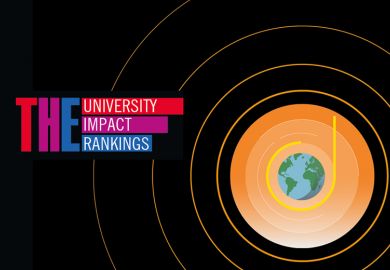Last updated 4 January 2024
At Times Higher Education we create university rankings to assess university performance on the global stage and to provide a resource for readers to understand the different missions and successes of higher education institutions.
Our rankings cover the three main missions of university activity: research, teaching and impact.
Each university in the rankings has a detailed profile, with a breakdown of its overall scores across the rankings and supplementary data designed to help students. For example, there are data on the staff-to-student ratio at each university, the total income per student, the proportion of international students and the gender breakdown of students.
Some universities have enhanced profiles to showcase their student offer and their individual strengths and qualities beyond the rankings data. To raise your university’s global profile with THE, please contact branding@timeshighereducation.com.
THE’s rich data have become a vital resource for students, helping them to make one of the most important decisions of their lives – who to trust with their education.
To help students get the most out of our rankings, we have a dedicated Student section, providing student-focused news and advice and featuring a wide range of student blogs with invaluable first-person advice and tips.
The rankings are also widely used by faculty to inform career decisions, by university leaders to help set strategic priorities and by governments to help monitor policy. Why? Because the THE rankings are based on one of the richest databases of university performance in the world.
Ten ways THE has improved the university rankings landscape
One ranking to rule them all? Absolutely not
Research rankings
The THE World University Rankings, founded in 2004, have an emphasis on the research mission.
Our carefully balanced and comprehensive methodology was developed after more than a decade of working in consultation with the world’s leading universities, and builds on our team’s deep understanding of what makes a university truly world class.
Our team of data experts evaluates world-class universities against 18 separate performance indicators, covering the full range of a top university’s essential areas of activity: teaching, research, knowledge transfer and international outlook.
THE’s rich data has become a vital study advice resource for students, helping them to make one of the most important decisions of their lives – who to trust with their education.
The overall THE World University Rankings, featuring more than 1,500 institutions, are accompanied by a series of subject-specific rankings to help students determine where to study:
- Arts and humanities
- Business and economics
- Clinical and health
- Computer science
- Education
- Engineering
- Law
- Life sciences
- Physical sciences
- Psychology
- Social sciences
All the rankings tables can be filtered by country and can be personalised to create a new rankings against any one of five key areas of performance, to suit user preferences.
You can read more about why THE’s methodology is trusted by students and watch our 90-second student guide to the rankings methodology below.
To create the THE World University Rankings 2024 list, THE’s data team drew on a comprehensive and growing database containing hundreds of thousands of data points on more than 2,600 global research universities, and employed a global Academic Reputation Survey of more than 68,000 leading scholars, who provided us with their expert views on the world’s leading universities.
In addition, we also analysed 134 million citations to 16.5 million academic publications (from Elsevier’s Scopus database) published over a five-year period between 2018 and 2022.
As well as the flagship THE World University Rankings, THE has drawn on its rich database, and in some cases collected additional data, to create a series of regional and thematic rankings, offering deeper insights into a wider range of universities against a wider range of missions, and providing students with even greater resources. Our major rankings are:
- Asia University Rankings
This is focused on universities in Asia. The methodology gives more weight to knowledge transfer, research income and research productivity, while teaching and research reputation count for less. This reflects Asian universities’ close ties to industry as well as the fact they tend to be younger than their Western counterparts and, therefore, are typically not as well known or well regarded across the world.
Click to read analysis of the 2023 results - Young University Rankings
This includes the world's top universities aged 50 years and under. The methodology reflects the special characteristics of younger universities, giving less weight to subjective indicators of academic reputation.
Click to read analysis of the 2023 results - Latin America Rankings
This includes universities in the Latin America and Caribbean region. The methodology gives less weight to citation impact and more weight to teaching and research environment metrics.
Click to read analysis of the latest results - World Reputation Rankings
This explores the reputation of the world’s leading universities, based on the largest invitation-only academic opinion survey
Click to read analysis of the latest results - Arab University Rankings
This includes universities in the Middle East and North Africa. The methodology include three bespoke metrics, while the calculations of some of the other metrics have been adjusted to reflect the features of universities in the Arab world.
Click to read an analysis of the latest results - Interdisciplinary Science Rankings
The inaugural ranking will be published in 2024. It will list the world's top universities for interdisciplinary research in science disciplines.
Click to read about the ranking
Impact rankings
In 2019, we launched our first Impact Rankings, the only global league table that assess universities against the United Nations' Sustainable Development Goals (SDGs).
Alongside the overall Impact Ranking, there are 17 tables showing universities' progress towards delivering each of the SDGs.
We use carefully calibrated indicators to provide comprehensive and balanced comparisons across four broad areas: research, outreach, stewardship and teaching.
We have compiled a list of frequently asked questions about our Impact Rankings, but if you have any further questions, email impact@timeshighereducation.com.
Click to read analysis of the latest results
Teaching rankings
Our first teaching rankings – exploring the second of the great university missions – was launched in 2015.
These rankings give students and their families the information they need to help them choose where to study, and have a survey of current students at their heart. The overall methodology explores four key areas, which we call pillars: resources, engagement, outcomes and environment.
- Japan University Rankings
This ranking is based on 16 performance indicators, with three of the metrics drawing on the THE Japan Student Survey.
Click to read analysis of the latest rankings - Online Learning Rankings
The inaugural ranking will be published in late 2024. It will include universities across the world that offer online undergraduate and/or postgraduate degree programmes.
Between 2017 and 2022, we published the US College Rankings, in partnership with the Wall Street Journal. We no longer publish this ranking.
Hybrid rankings
The first Sub-Saharan Africa University Rankings was launched in June 2023. THE created this ranking in partnership with Mastercard Foundation to assess the impact of higher education across the region, based on five pillars: resources and finances, access and fairness, teaching skills, student engagement, and Africa impact.
The Sub-Saharan Africa University Rankings methodology was developed by THE’s data team, in consultation with university leaders across sub-Saharan Africa. The project was initiated by a consortium of African and international higher education organisations including Botho, Maverick and Mycos, and led by Ashesi University in Ghana. THE independently managed all data collection and calculations.
If you would like more information about the SSA University Rankings, or want to offer feedback, contact us at SSARanking@timeshighereducation.com.
Our core values
We maintain editorial independence when producing our rankings. Our approach is enshrined in five core values, which we call TRAITs: truthfulness, relevance, accountability, independence and transparency. Read more about our core values here.
For the latest rankings-related news, follow us on Twitter @THEworldunirank and register with us to sign up for our newsletters. Join our community of global higher education leaders at one of our summits for the exclusive launch of the latest THE ranking for that region.
Register to continue
Why register?
- Registration is free and only takes a moment
- Once registered, you can read 3 articles a month
- Sign up for our newsletter
Subscribe
Or subscribe for unlimited access to:
- Unlimited access to news, views, insights & reviews
- Digital editions
- Digital access to THE’s university and college rankings analysis
Already registered or a current subscriber? Login



